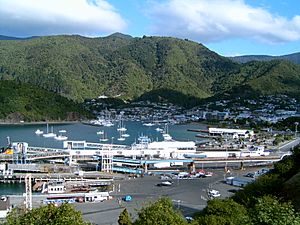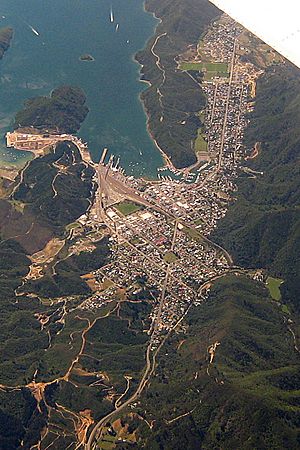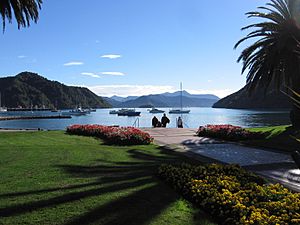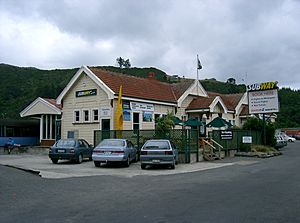Picton, New Zealand facts for kids
Quick facts for kids
Picton
Waitohi (Māori)
|
|
|---|---|

A view of the harbour in Picton
|
|
| Country | New Zealand |
| Region | Marlborough |
| Ward |
|
| Electorates |
|
| Area | |
| • Total | 9.64 km2 (3.72 sq mi) |
| Population
(June 2023)
|
|
| • Total | 4,880 |
| • Density | 506.2/km2 (1,311.1/sq mi) |
| Postcode(s) |
7220
|
Picton (Māori: Waitohi) is a town in the Marlborough Region of New Zealand's South Island. It is located at the top of the Queen Charlotte Sound / Tōtaranui. Picton is about 25 kilometres north of Blenheim and 65 kilometres west of Wellington. The nearby area of Waikawa is considered part of Picton.
Picton is a very important transport hub in New Zealand. It connects the South Island's roads and railways with ferries that cross Cook Strait to Wellington and the North Island. The Picton area has a population of 4,880 (June 2023), making it the second-largest town in the Marlborough Region, after Blenheim. It is also the easternmost town in the South Island with over 1,000 people.
Contents
About Picton: Name and History
What does the name Picton mean?
The town is named after Sir Thomas Picton. He was a Welsh soldier who worked with the Duke of Wellington. Sir Thomas Picton died at the Battle of Waterloo.
Some people have asked for places named after Thomas Picton to be renamed. This is because of his past connections to the slave trade and his time as governor of Trinidad.
What is the Māori name for Picton?
The town's Māori name is Waitohi. This means 'waters of the tohi ritual'. The tohi was a special baptism ceremony for warriors before they went into battle.
During the ritual, warriors would stand along a sacred stream. A tohunga (chosen expert) would dip a branch of karamū bush into the stream. They would then strike each warrior on the right shoulder. The tohi rite was last performed on soldiers of the 28th Māori Battalion during World War II.
How did Picton begin?
Before Europeans arrived, the Te Atiawa o Te Waka-a-Māui iwi (tribe) lived at Waitohi Pā. This was on the same spot where Picton is today. In March 1850, Sir George Grey and Sir Francis Dillon bought the land from Te Āti Awa. The iwi then moved to nearby Waikawa Bay.
In 1859, the Marlborough Province was created. The newly named Picton became its capital city. However, the capital was moved to Blenheim in 1865.
What famous author lived in Picton?
The famous author Katherine Mansfield spent time in Picton. Her grandparents, Arthur and Mary Beauchamp, and her father Harold, lived there for a while after coming from Australia. Katherine Mansfield wrote about the port in her short story "The Voyage". This story describes a trip to Picton from Wellington on the Cook Strait ferry.
When did the ferry service start?
The roll-on/roll-off (RORO) ferry service between Picton and Wellington began on 11 August 1962. This service carries both cars and trains. The New Zealand Railways Department operated the first ferry, called the GMV Aramoana.
Picton's Location and People
Where is Picton located?
Picton is located in an inlet called Picton Harbour. This harbour is on the south side of the upper Queen Charlotte Sound / Tōtaranui. Wedge Point is to the west, separating it from Grove Arm. The Snout is to the east, separating it from Waikawa Bay. Inside the harbour, Kaipupu Point divides the inlet into Picton Harbour and Shakespeare Bay.
The main part of the town is on flat land at the head of Picton Harbour. The Waitohi River flows through the town and into the sound near the ferry terminal. The town also extends towards Waikawa Bay.
Picton is surrounded by hills and mountains. These include Te Tara-o-Te-Marama/Mount Freeth to the west and the Robertson Range to the south. The Elevation Saddle connects the town to the Tuamarina River valley. This saddle holds the main roads and railways that link Picton to the rest of the South Island.
How many people live in Picton?
Picton, including Waikawa, is considered a small urban area by Statistics New Zealand. It covers about 9.64 square kilometres. As of June 2023, its estimated population was 4,880.
At the 2018 New Zealand census, Picton had a population of 4,503 people. This was an increase of 486 people since the 2013 census. There were 1,950 households. The population included 2,277 males and 2,226 females. About 582 people (12.9%) were under 15 years old.
What are the ethnic groups in Picton?
The census showed that 87.9% of people identified as European/Pākehā. About 18.3% identified as Māori. Other groups included 1.9% Pasifika, 2.5% Asian, and 1.9% other ethnicities. Some people identified with more than one ethnicity.
About 17.6% of people were born overseas. This is lower than the national average of 27.1%.
What are the religious beliefs in Picton?
When asked about religion, 52.3% of people said they had no religion. About 35.0% were Christian. Smaller numbers followed Māori religious beliefs (1.3%), Hindu (0.4%), Muslim (0.1%), or Buddhist (0.5%). About 1.3% had other religions.
What jobs do people in Picton have?
Picton's economy relies a lot on its role as a transport hub. It also serves tourists and local residents in the Queen Charlotte Sound. In 2018, the biggest industries for jobs in Picton were:
- Hotels and restaurants (accommodation and food services)
- Transport, postal services, and warehousing
- Shops (retail trade)
How Picton is Governed
The Picton Borough Council used to govern the town, starting in 1876. This council was removed in 1989 as part of local government changes. Picton then became part of the Marlborough District.
For local elections, Picton is part of the Marlborough Sounds ward. This ward chooses three of the council's thirteen councillors.
At the national level, Picton is part of the Kaikōura general electorate. It is also part of the Te Tai Tonga Māori electorate.
What is Waikawa Marae?
Waikawa Marae is a special meeting place located in Picton. It belongs to Te Atiawa o Te Waka-a-Māui. The marae includes the Arapaoa wharenui (meeting house). In October 2020, the government provided money to upgrade the marae. This project also created 18 jobs.
Fun Things to Do in Picton
Picton is often the starting point for holidays in the Marlborough Sounds. There are many fun activities to enjoy:
- Fishing
- Walking, including the Queen Charlotte Track
- Diving
Diving Adventures in Picton
A very popular dive trip is to the wreck of the cruise liner MS Mikhail Lermontov. This ship is 177 metres long and lies 37 metres underwater in Port Gore. Dive boats leave from Picton to visit this wreck. It is one of the world's largest and most accessible shipwrecks.
It's important to have a guide when diving the Mikhail Lermontov. The wreck is in 30 metres of water and lies on its side. Divers can easily get lost inside the ship.
Other dive spots near Picton include Fish Reserve, the Koi wreck, and Long Island Marine Reserve. You can also take beginner diving lessons (discover scuba dive) or get PADI (Professional Association of Diving Instructors) certification in Picton.
The Edwin Fox Maritime Centre
The Edwin Fox Maritime Centre is a museum in Picton. It features the remains of the Edwin Fox. This is the only surviving ship that transported convicts to Australia. The centre also has a small museum with interesting exhibits.
Getting Around Picton
Roads and Railways
State Highway 1 connects Picton south to Blenheim, Kaikōura, and Christchurch. The scenic Queen Charlotte Drive also goes west to Havelock. This road is shorter but usually slower.
The Main North Line railway opened between Picton and Blenheim in 1875. The full line south to Christchurch was completed in 1945. The railway climb from Picton to Elevation Saddle is very steep. It required a viaduct over the Waitohi River. The original viaduct was the largest wooden structure in the southern hemisphere. It was replaced in 1963 by a concrete and steel structure.
The original Picton railway station was on London Quay. The current station on Auckland Street was built in 1914. The Coastal Pacific train used to travel daily between Christchurch and Picton during summer. These services stopped in 2021 but are planned to restart in November 2022.
Ferry Services
Roll-on/roll-off (RORO) ferries connect Picton with Wellington. These ferries are the main link between the North and South Islands across Cook Strait. Two main companies, Interislander and StraitNZ, operate this route. Both carry passengers and vehicles. Interislander also carries rail wagons on one of its ferries.
There have been ideas to move the ferry terminals to Clifford Bay to shorten travel times. However, these plans were never carried out. In 2019, discussions began about redeveloping the ferry area. This was because Interislander planned to introduce new, larger ferries in 2024. However, the ferry replacement project was cancelled in 2023. The Interislander terminal building, built in the 1960s, was demolished in 2024.
Cruise Ships and Flights
Cruise ships often visit Picton between October and April. In the 2018–19 season, 44 ships visited, bringing 85,000 passengers.
Picton Aerodrome is about 7.4 kilometres south of the town, in Koromiko. It has regular flights to Wellington with Sounds Air. You can also take charter flights around the Marlborough Sounds from here.
Education in Picton
The first school in Picton opened in 1861. A new school opened in 1882. A Catholic Convent school opened in 1915, replaced by St Joseph's in 1924. St Joseph's closed in 2017.
Before 1965, there was no high school in Picton. Students had to travel to Marlborough College in Blenheim. Queen Charlotte College opened in 1965 to serve Picton. It also took over intermediate school classes (Years 7 and 8) from Picton and Waikawa Bay schools.
Today, Picton has three schools:
- Picton School is a state primary school for Year 1 to 6 students. It has about 91 students.
- Queen Charlotte College is a state secondary school for Year 7 to 13 students. It has about 408 students.
- Waikawa Bay School is a state primary school for Year 1 to 6 students in Waikawa. It has about 130 students.
Media in Picton
Seven Blenheim FM radio stations are rebroadcast in Picton. These include The Hits, Life FM, and More FM. They are relayed through a transmitter on Mount Freeth. Picton can also receive AM radio broadcasts from Wellington.
A private television translator was built in 1964 on Mount Freeth. It relayed WNTV1 (now part of TVNZ 1) from Wellington. This translator was later upgraded for colour TV and a second channel, Television Two (now TVNZ 2). It was turned off in April 2013 when New Zealand switched to digital television. Now, TV in Picton is broadcast only by satellite (Freeview or Sky).
Famous People from Picton
Many notable people have connections to Picton:
- Lance Cairns – A famous All-rounder for the New Zealand cricket team.
- Chris Cairns – Also a well-known cricketer.
- Kip Colvey – A professional footballer who played for Colorado Rapids and the New Zealand men's national football team.
- Tony Johnson – A New Zealand rugby broadcaster.
- Joseph Sullivan – A Gold Medalist in Double Sculls at the London 2012 Olympic Games.
Images for kids
See also
 In Spanish: Picton (Nueva Zelanda) para niños
In Spanish: Picton (Nueva Zelanda) para niños
 | James B. Knighten |
 | Azellia White |
 | Willa Brown |






